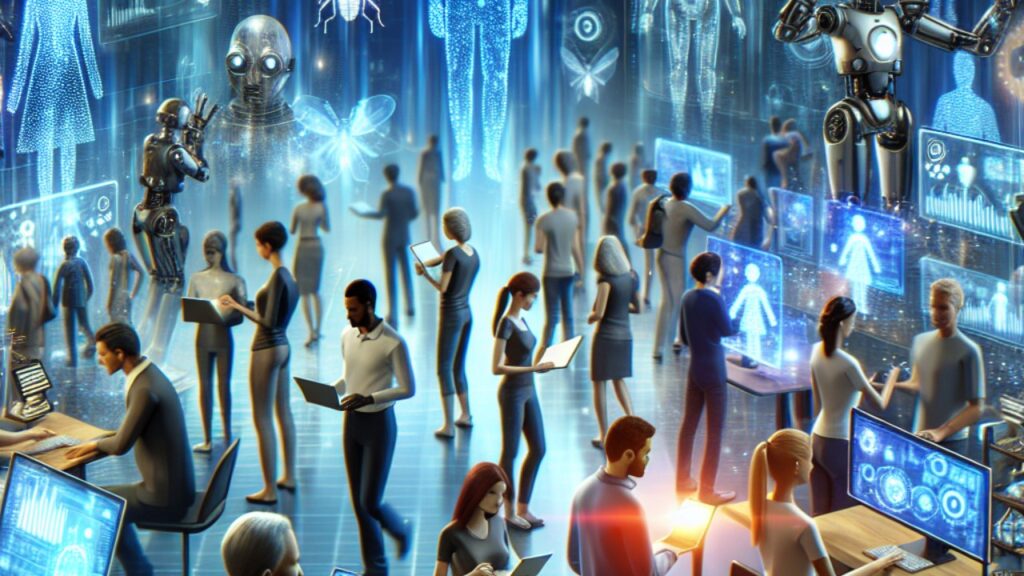Nearly every day, Binny Gill is at work. He founded and serves as CEO of Kognitos, an organization that automates business procedures with generative artificial intelligence. Gill anticipates working weekends because he was the company’s initial idea man. He further predicts that when AI permeates the workplace more deeply, more driven individuals will feel pressured to follow suit.
The belief that industrious bots would take over most of the menial tasks is at the center of most of the discussion over how AI might change our job categories. In addition to perhaps making the transition to a four-day workweek simpler, the idea is that this would free us up for more creative or “deep” work.
It seems that this theory is supported by Steve Cohen, the billionaire hedge fund manager and majority owner of the New York Mets. He stated that it might lead to increased demand for leisure enterprises in the beginning of April, which would free up more time for golf.
Beyond greater time spent on the fairway, Gill sees another possibility: AI might turbocharge the “always-on” culture and push some of us to work harder, not less. According to him, conventional businesses will leverage AI to stay competitive — having AI make judgments that require human input — and will eventually become round-the-clock machines.
He anticipates that if his clients grow accustomed to receiving assistance from AI on the weekends, they may start to anticipate that kind of service all the time. He claimed that although humans will perform less manual labor, they will always be available as businesses cannot afford to lose because their primary focus is on outperforming their rivals.
Workers might take on babysitting duties at different periods of the day, of course, if someone needs to supervise AI bots at all times. In addition, for certain employees that can still equal less than 40 hours per week. Still, Gill contends, perhaps not for others.
Gill can instruct his engineers to rest over the weekend because my clients take Saturday and Sunday off. Nevertheless, Gill noted that as AI transforms human labor, people will grow increasingly worn out and busy. “Not across the board, but in the majority case.”
Looking for a payoff
Some people do not believe that AI will crush the idea of a four-day workweek. Senior director analyst Emily Rose McRae of the research firm Gartner anticipates that the concept will transition from “radical to routine.” She informed that businesses might find it difficult to defend the additional costs associated with ramping up operations to run around-the-clock when AI becomes our taskmaster.
Those expenses must have a result of some kind. Furthermore, McRae noted that “‘Our competitors are doing it’ is only going to be effective in the event that there is a market for that specific type of coverage”. She continued by saying that because overworked employees are pushing back, many businesses have reduced the quality of service they formerly provided in recent years.
McRae believes that in order for managers to hold onto their employees, competitive pressure may even push more businesses to test out a four-day workweek before leadership may feel ready. Going round the clock would also be challenging because it might need too many employees, according to her.
“We fundamentally do not have enough people in the workforce,” said McRae. “AI makes you able to do things faster, not go 24 hours.”
Simon Johnson, a former top economist at the International Monetary Fund and Massachusetts Institute of Technology professor of global economics and management, told that many white-collar workers already experience pressure to put in more hours. “I don’t see how AI is going to help with that,” he stated.
Johnson stated that he believes the four-day workweek will become a reality. However, he noted that one major concern with AI is what unimaginable new tasks the technology might produce in the next five to ten years. The response might influence how our weeks go.
He suggested that there might be more pressure to work, but it might also free individuals up to concentrate on more artistic endeavors on their own time or at work. According to Johnson, there are currently not many productivity increases for activities that AI can perform.
Regular employees stand to benefit if technology produces a greater number of tasks for us to perform. However, if it doesn’t and starts to eliminate jobs, that will increase competition for the jobs that are remaining. According to him, you don’t give the employees more money or allow them to work fewer hours in that circumstance.
The vice president of product at work-management platform Wrike, Alexey Korotich, told that AI will make it easier for employees to take breaks and lessen the need to be “always on.” Workers will have real-time access to information anytime they want. He cited the advantages of email over snail mail. Companies may become more efficient if a message could be conveyed in seconds as opposed to days or weeks.
Their issue was resolved by email. However, it also led to another issue, according to Korotich, which is that sending emails is now so inexpensive that people find it difficult to reply to them.
It’s up to management to decide
CEO of 4 Day Week Global, a group that promotes a shorter workweek, Dale Whelehan, told that even if AI enables many of us to work less, it will be crucial that bosses do the same. If not, employees who aspire to become managers will experience pressure to emulate such conduct and put in additional hours. According to Whelehan, management will ultimately choose whether AI results in job losses or makes a four-day workweek possible.
“The big promise in the early 2000s was technology. Instead of causing a significant loss of jobs, it didn’t. Numerous new employment were produced by it. Huge quantities of invention were produced by it, but he claimed that it didn’t truly make life easier for us in terms of achieving a better work-life balance.
For his side, Gill of Kognitos believes that even with the aid of AI, many people’s need to amass more and stay ahead of the curve means their workweeks may not end at four days.
From his perspective, there is no clear correlation between the amount of hours worked in a week and technology. “It’s just related to ‘Is there an urge to be better than your neighbor?”














